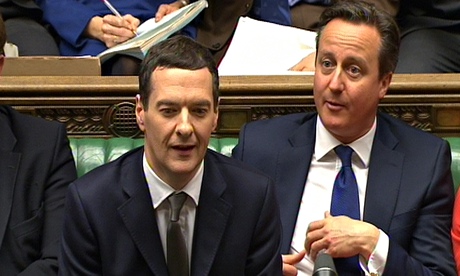
I keep wondering who George Osborne reminds me of, and it finally came to me, during what I hope – in common, I imagine, with tens of millions of British citizens – will prove to have been his last budget speech.
During the austerity years of 1945-51, there was no shortage of demand, but a severe shortage of supply. Also, the country was broke, and there was, to coin a phrase, no alternative to austerity, of which the most obvious manifestation was rationing.
There arose, during that period, a breed of person known as a “spiv”. Spivs would have access to cigarettes, women’s stockings (“nylons”) and other goods in short supply, and would make them available at a price. Spivs used to crop up in Ealing comedies, and a popular phrase became “Would you buy a used car from this man?”
Osborne reminds me of some of those characters. Early on in his speech last Wednesday, he rightly praised the independence and integrity of Robert Chote and his team at the Office for Budget Responsibility. But he could not resist having a cheap dig at his predecessors as chancellor by claiming that, before the OBR was set up, economic forecasts were “fiddled and fixed” – an ad lib that did not appear in the official text of his speech.
He proceeded to make silly boasts about the way that, after a long period of “flatlining”, the British economy has, for a very short time, been outpacing some of our continental neighbours. There followed a series of laboured (no pun intended) jokes that were frankly embarrassing. I kept thinking: “Is this man really at the helm of one of the great offices of state?”
For all his diversionary tactics and legerdemain, Osborne cannot get away from the fact that he has presided over the slowest and feeblest recovery in living memory. He made an economically and socially damaging strategic error in comparing the British position to that of Greece in 2010, and then embarking on “austerity”.
There is a popular view that he to some extent recognised the error of his ways, and deliberately eased the squeeze, so that he ended up merely halving the fiscal deficit instead of fulfilling his wild promise to eliminate it in the course of this parliament.
What actually happened was that, thanks largely to the dampening effect of austerity on both public sector and private sector investment, there was not enough economic growth to meet the forecasts of revenue, and the deficit therefore remained much higher than predicted. Insofar as he became a “Keynesian”, he tolerated the position instead of imposing further austerity.
We come now to the view, encouraged by leaks and chancellorial spinners that, if re-elected, Osborne will ease up on austerity. On the contrary. Chote, a journalist by training, did not get where he is today without a good turn of phrase, and, once again, he has livened up what inevitably tends to be a rather worthy OBR economic and fiscal outlook.
Previously, the OBR has provided some good quotes about how the chancellor’s plans imply at some stage the lowest level of public spending as a proportion of GDP since whenever. This time the operative quote is the phrase “rollercoaster profile”.
Indeed, the OBR’s judgment, redolent of the independence so valued by Osborne, is worth repeating: “The coalition government’s policy decisions in this budget are not expected to have a material impact on the economy.” What is implied is “a rollercoaster profile for public services spending… a much sharper squeeze on real spending in 2016-17 and 2017-18 than anything seen over the past five years followed by the biggest increase in real spending for a decade in 2019-20”.
When he was director of the Institute for Fiscal Studies, Chote was the supreme arbiter of governmental economic claims. I was concerned that, when he moved to the Treasury-funded OBR, he would lose a degree of independence.
Well, he hasn’t. And his successor at the IFS, Paul Johnson, fully maintains standards there, proving to be another thorn in the flesh of the chancellor. As Johnson says: “There is no actual increase [in incomes] in the data we have seen so far... Real incomes have fallen, as Mr Miliband says.” Yet, according to Osborne, real incomes are now above their 2010 level.
It is, incidentally, pretty pathetic that the chancellor finds himself scraping the barrel of statistical definitions in an attempt to prove that, five years later, incomes may possibly have edged above the position he inherited!
And he plumbed another depth when he departed from his script again to boast that, whereas Labour spent taxpayers’ money rescuing the banks, he is now giving it back. If the banks had not been rescued, there might not have been a functioning economy for Osborne to preside over.
But back to his rollercoaster timetable. You see the naked politics of this? More damage to the fabric of society would be imposed and then, hey presto, a pre-election boom.
Or not, as the case may be. In common with most people I meet, I have until recently been saddened by the lacklustre public performances of the leader of the opposition. But when he replied to the budget speech, he began to look a lot more impressive. Let us hope that the improvement continues. This government has presided over a dreadful economic policy and does not deserve to be re-elected.

